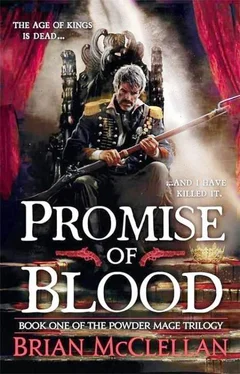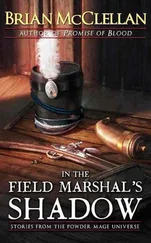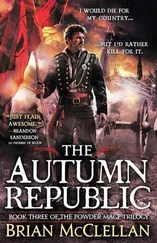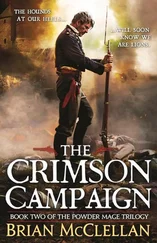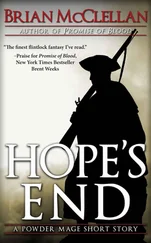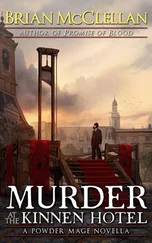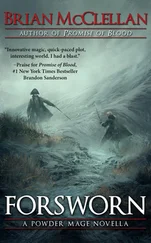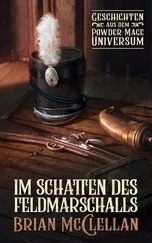The lockpick gaped up at Adamat from his knees.
“You’re making enough noise, you might as well have knocked on the front door,” Adamat said. He sighed and lowered his cane and spoke to the best-dressed of the three. “What do you want, Palagyi?”
Palagyi seemed surprised to see him here. He pushed at a pair of round spectacles that rested more on his chubby cheeks than on his thin nose. The man was an oddity, with a body that would seem more at home in a circus than anywhere else. He had a round belly that hung far over his belt, but his arms and legs were no thicker than a sapling. It made him look like an oversized cannonball with sticks for arms.
He was a longtime street thug who had just enough ruthlessness to rise to legitimate businesses and not quite enough intelligence to leave his dark life behind him. Aptly suited as a banker. Adamat cataloged his criminal record in his mind in an instant.
“Word had it that you’d skipped town,” Palagyi said.
“You mean the word of that inbred you’ve had skulking around my house for the last couple of weeks?”
“I have a reason to keep my eye on you.” He seemed annoyed that Adamat was actually still there.
Adamat gave a long-suffering sigh and watched Palagyi grind his teeth. Palagyi hated when he wasn’t taken seriously. He’d changed little since he was just a half-drunk loan shark. “I’ve got two months until my debt is due.”
“There is absolutely no way you’re going to gather seventy thousand krana in two months. So when I hear your family is skipping town in the middle of the night, I think perhaps you’ve decided to take the coward’s way and run for it.”
“Careful who you call a coward,” Adamat said. He reversed his grip on his cane.
Palagyi flinched. “I took my last beating from you long ago,” he said, “and you’re no longer protected by the police. You’re just one of us now, an ordinary gutter rat. You shouldn’t have taken out a loan with me.” He laughed. It was a tinny sound that grated on Adamat’s nerves.
It was Adamat’s turn to grind his teeth. He’d not taken out a loan from Palagyi, but from a bank belonging to a friend. That friend proved a bad one when he sold the loan to Palagyi for nearly one hundred and fifty percent of its worth. Palagyi had promptly tripled the interest and sat back and waited for Adamat’s new publishing business to fail. Which it had.
Palagyi wiped a tear of mirth from his eye and snorted. “When I learn that one of my biggest private loans has sent his family out of town just two months before his loan is due, I check on it personally.”
“And try to break into his house?” Adamat said. “You can’t clean me out and throw us onto the street until after I’ve defaulted.”
“Perhaps I got greedy.” Palagyi smiled thinly. “Now, I’m going to need to know where your family is so that I can check in on them.”
Adamat spoke through clenched teeth. “They’re at my cousin’s. East of Nafolk. Check all you want.”
“Good. I will.” Palagyi turned to go, when he stopped suddenly. “What’s your girl’s name? The youngest one. I think I’ll have some of my boys bring her back, just in case you try to slip onto one of those new steamers and make for Fatrasta.”
Palagyi had just enough time to flinch before Adamat’s cane cracked over his shoulder. Palagyi cried out and stumbled into the garden. The coal shoveler punched Adamat in the belly.
Adamat doubled over from pain. He’d not expected the man to hit so fast or so hard. He nearly dropped his cane, and it was all he could do to remain standing.
“I’ll have the police on you!” Palagyi wailed.
“Try it,” Adamat wheezed. “I still have friends there. They’ll laugh you into the street.” He regained his composure and pulled himself up enough to slam the door. “Come back in two months!” He locked the door and slid the deadbolt.
Adamat held his stomach and staggered back to his office. He’d have indigestion from that blow for a week. He hoped he wasn’t bleeding.
Adamat spent a few minutes recovering before he gathered his letters and set out into the streets. He could feel tension growing around him. He wanted to attribute it to the coming conflict that he knew would happen – the revolution that would sweep the city when Manhouch was declared dead, and the chaos that would follow. Adamat prayed that Tamas would keep it in check. A task that might very well prove impossible. But no, the tension was likely just Adamat’s growing headache and the pain in the pit of his stomach.
Not far from the postmaster’s, Adamat stopped on a street corner to catch his breath. His stride had been unconsciously hurried, his breathing hard, a worried sense of danger lurking in the back of his mind.
A newsie lad, no more than ten, sprinted into view. He stopped on the corner next to Adamat and took mighty gasps before throwing his head back and shouting:
“Manhouch has fallen! The king has fallen! Manhouch faces the guillotine at noon!” Then the boy was gone, onto the next corner.
Adamat snapped himself out of a stunned silence and turned to watch others do the same. He knew that Manhouch had fallen. He’d seen the blood of the royal cabal on Tamas’s jacket. Yet hearing it spoken aloud on a public street made his hands tremble. The king had fallen. Change had been forced on the country, and the people would be forced to choose how they’d react.
The initial shock of the news passed. Confusion set in as pedestrians changed their plans midstride. A carriage turned around abruptly in the street. The driver didn’t see the small girl selling flowers. Adamat rushed out, grabbed her by the arm, and pulled her away before the horses could trample her. Her flowers spilled into the street. One man shoved another in a sudden, hurried dash across the street and was in turn shoved to the ground. A fistfight began, only to be quickly put down by a truncheon-wielding police officer.
Adamat helped the girl pick up her flowers before she ran off. He sighed. It’s begun. He put his head down and pushed on toward the postmaster’s.

Tamas stood on a balcony six floors above the enormous city square called the King’s Garden, his face in the wind, watching the crowds gather. His two hounds slept at his feet, unaware of the importance of this day. He wore his freshly pressed dress uniform; dark blue with gold epaulettes on each shoulder, and gold buttons – each of them a small powder keg. The lapel, collar cuffs, and wings of his uniform were of red velvet, his belt of black leather. He wore his medals at the insistence of his aides: gold, silver, and violet stars of various shapes and sizes awarded to him by half a dozen Gurlish shahs and kings of the Nine. He held his bicorne hat under one arm.
The sun was just barely above the rooftops of Adopest, yet he guessed there were already fifteen thousand people below watching as crews constructed a line of guillotines. It was said the Garden could contain four hundred thousand, half the population of Adopest.
They would find out today.
His gaze fell across the Garden to the tower that rose like a thorn against the morning sky. Sabletooth had been built by Manhouch’s father, the Iron King, as a prison for his most dangerous enemies, and as a warning to all the rest. It had taken almost half of his sixty-year reign to build and its color had given the Iron King his nickname. It was three times the height of any building in Adopest, an ugly thing, a nail of basalt that looked like it had been ripped from the pages of a legend from before the Time of Kresimir.
Читать дальше
